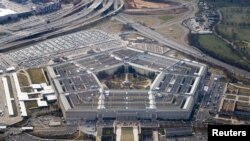"We can confirm this was a false report and the Pentagon was not attacked today," a Pentagon spokesman said.
The image, which many observers suspected came from artificial intelligence, was spread by several accounts, forcing the Pentagon to comment that there was no such explosion.
The Arlington, Virginia fire department also reacted, posting on social media that there was no explosion or incident taking place at or near the Pentagon.
The shared image caused the markets to be knocked for a few minutes, with the S&P 500 stumbling by 0.29 percent compared to its Friday close before recovering.
"There was a dip likely related to this fake news as the (trading) machines picked up on it, but I would submit that the scope of the decline did not match the seemingly bad nature of the fake news," said Pat O'Hare of Briefing.com.
The earliest tweet found by AFP sharing the Pentagon image came from a QAnon-promoting account that has previously shared disinformation, though the original source of the image was not known.
Emerging generative AI technologies make it easier for non-specialists to create convincing images in just a few moments, instead of needing the expertise to use programs such as Photoshop.
The incident followed other occurrences of fake imagery that also created buzz recently on the internet, including of former US president Donald Trump getting arrested and Pope Francis in a puffer jacket.
